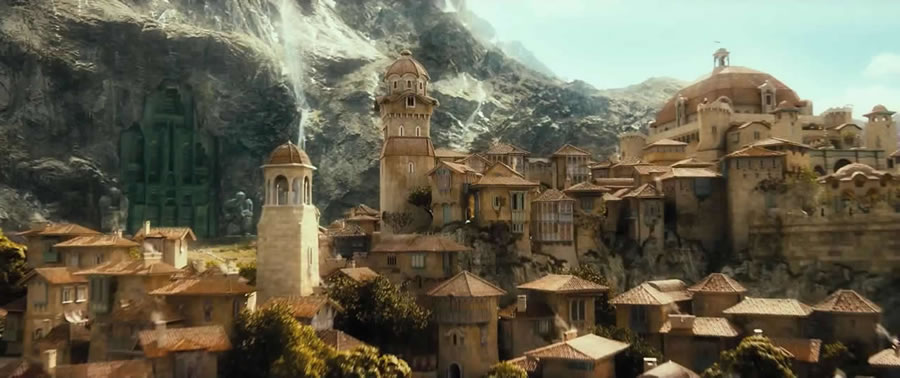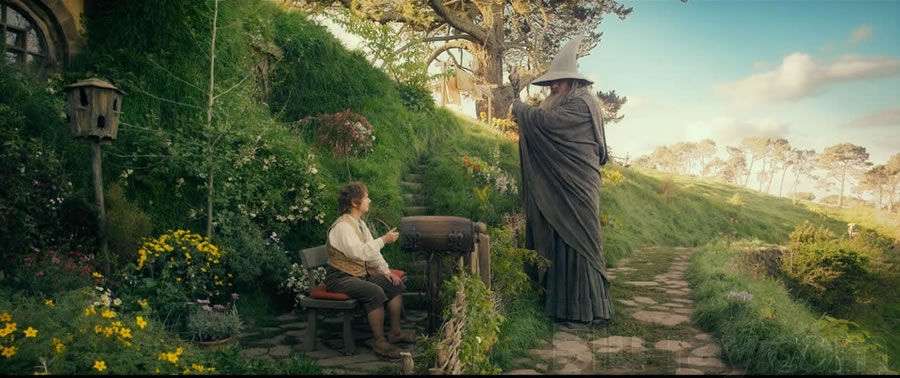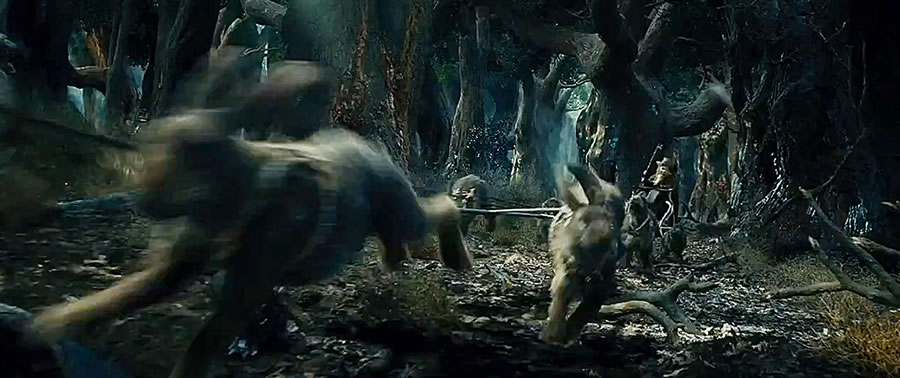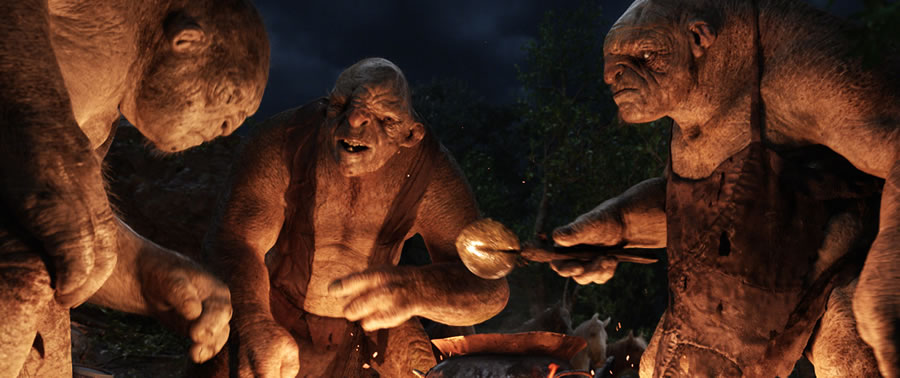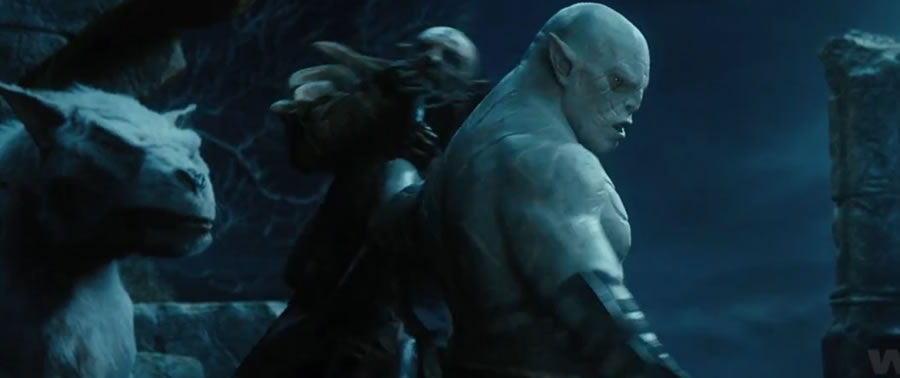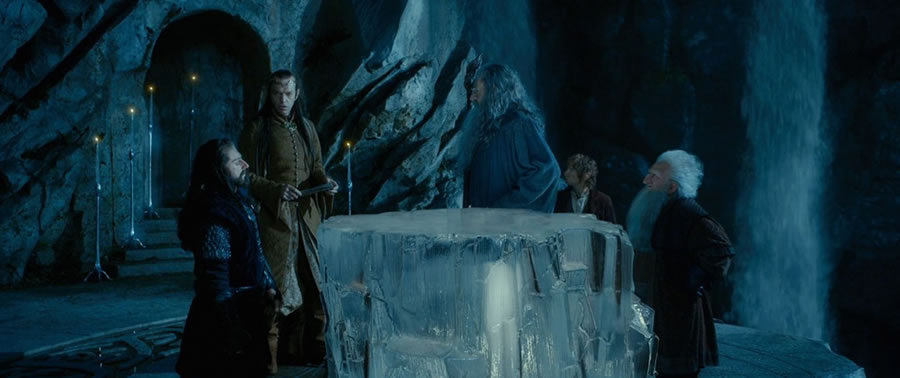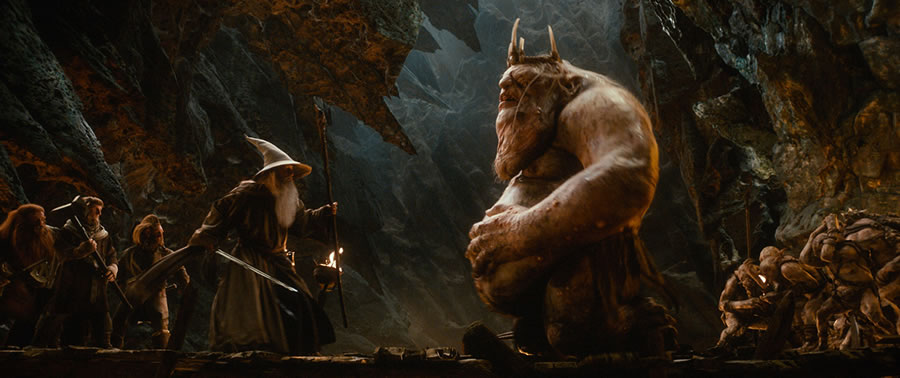Tollywood and The Hobbit of the Rings, Vol. I (08.08.13 by James Dunning) -
Comments
So Ilúvatar’s in His Heaven and all’s right with Middle-earth? (1) Well, not exactly. Many a moviegoer was doubtless entranced by The Hobbit: an Unexpected Journey. Yet the Eldar, irreconcilable lovers of Tolkien long before his derivative cinema, ask themselves once again: Why o why, such brilliant work notwithstanding, must the Tolkien Screenwriters Guild rewrite Tolkien? Interpretation is a given, invention kosher or according to Hoyle is sanctioned or even encouraged, but why the wholesale plot revisions?
The invented scenes with Radagast with his rabbit-drawn sleigh and his quaint Rhosgobel lair are brilliant and delightful to moviegoers, however are found neither in Hobbit nor in Lord of the Rings.
Tolkien’s Thorin in fact was not in the hall to greet the dragon, but out wandering afar, “a fine adventurous lad in those days.” (2) Thus his life was saved from Erebor’s holocaust. We never knew the missing wizards were Blue, even if Gandalf had forgotten their names (highly unlikely for Gandalf the consummate Loremaster of bygone ages).
A secret meeting of The White Council occurs in Rivendell, while Bilbo and Dwarves are otherwise engaged. Saruman the White, long immersed in the Enemy’s devices, exclaims to Gandalf: “Enemy? What enemy?” as if a new manifestation of Sauron were as surprising to him as tomorrow morning’s headlines. Furthermore, the Morgûl blade purloined by Radagast seems to have been buried with the Witch-King of Angmar. What? This reader cannot recall the death of this un-dead arch-Nazgûl villain. The Screenwriters Guild should have remembered Gollum’s line in the Dead Marshes from their own film: “No, you cannot kill them!”
Gollum’s performance was the finest of Andy Serkis to date, treacherous and loathsome! Yet at Bilbo’s escape from Gollum by a huge leap in the dark, Bilbo’s pity was left to silence. During that void my movie-going mind wanted to insert the background voice of Ian Holm as mature Bilbo: “No, not a fair fight...and there welled up in my heart a sudden understanding, a pity mixed with horror: a glimpse of endless unmarked days without light or hope of betterment, hard stone, cold fish, sneaking and whispering.” (3) That Bilbo spares Gollum by fairness and pity is an essential cornerstone for The Lord of the Rings and its climax.
When Bilbo materializes out of nowhere, I missed Gandalf’s queer penetrating look, saying: “Mr. Baggins has more about him than you guess.” (4) A fine prophetic remark! Also, in an incident that Tolkien never wrote, Bilbo leaves his tree to save Thorin from certain beheading by Azog the Goblin at the battle of “Fifteen birds in five firtrees.” (5) Given the insertions of Radagast, of Azog before the Five Armies, the spurious White Council findings, the near-beardless Dwarves and other contrivances seen above, the poor Professor must be spinning in his grave over radical departures from his legendarium. Such departures abound routinely in all three LOTR films.
So Tolkien Hollywood [“Tollywood”] has done it again. Despite the sage counsel of Isaac Asimov to judge film by its own merits and not by the literature whence it derives, what a crotchety old curmudgeon I must be, expecting Tollywood to conform more closely to the events of the book. When the script writer’s buzz saw of plot revision attacks works of literature other than Tolkien I find it much less unnerving. But we can see what sort of revisions to expect in sequels II and III. For all the enchanting optical vistas cinema conjures, something can also be sadly lost.
In distending The Hobbit both in duration and in philosophy to introduce so many matters darker and deeper, Tollywood has in effect created a LOTR cinematic prequel: The Hobbit of the Rings, like the prequels of another mighty cinematic fantasy epic. Yet by succeeding enormously at this, to my mind is lost much childlike innocence of the original children’s tale that this reader found so endearing. But never fear, for I also will raptly watch future installments as they appear on the wide silver screen and gorge myself on greasy, saline popcorn purchased at an exorbitant sum. Ka-ching!
James Dunning
Author of The Bright Lady and the Astral Wind
Director: Peter Jackson
Rated: Suitable for 12 years and over
Format: DVD
Studio: Warner Home Video DVD
Release Date: 8 April 2013
Run Time: 166 minutes
Footnotes
(1) Sincerest personal apologies to poet Robert Browning
(2) See J.R.R. Tolkien, The Hobbit, ‘An Unexpected Party’
(3) Ibid., ‘Riddles in the Dark’ (author’s adaptation)
(4) Ibid.
(5) Ibid., ‘Out of the Frying-pan into the Fire’
Spread the news about this J.R.R. Tolkien article:
